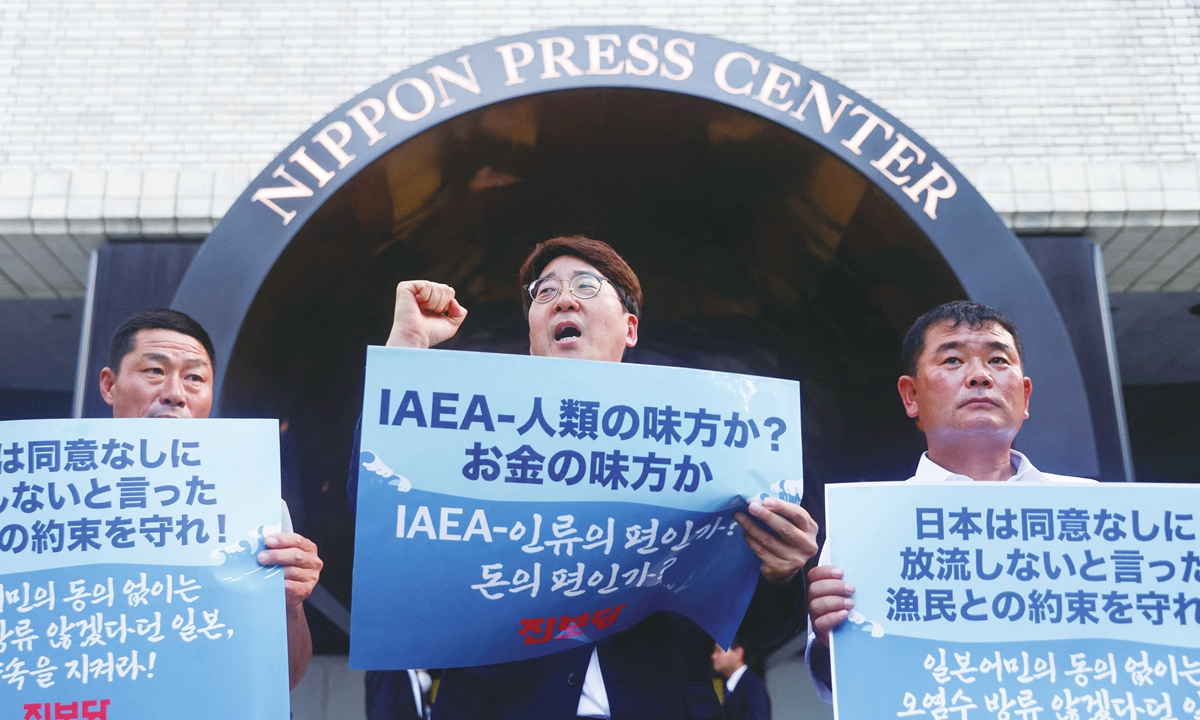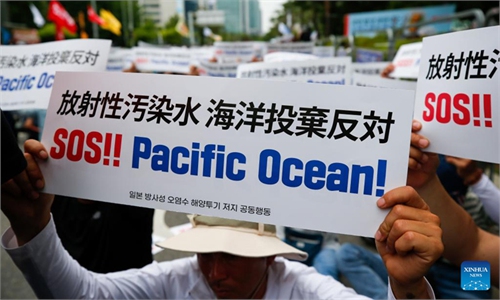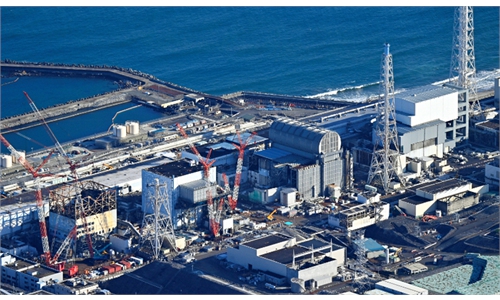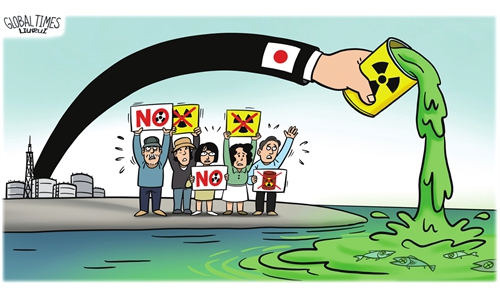Financial infiltration of international organizations poses threats to global security

A South Korean politician and fishermen protest to denounce the potential release of nuclear-contaminated water from Japan's Fukushima nuclear plant, ahead of a news conference by International Atomic Energy Agency (IAEA) chief Rafael Grossi (not pictured) outside the Nippon Press Center building in Tokyo, Japan July 4, 2023. Photo: IC
Former Singapore diplomat Kishore Mahbubani once suggested that multilateral organizations, which enjoy significant authority in their respective fields, face threats and challenges from developed countries' systematic use of money for infiltration and control. Take the World Health Organization as an example, Mahbubani laid out three approaches. First, the West starved the WHO of reliable long-term mandatory funding. The second was to focus on biomedicine, with its focus on individual behavior, instead of social medicine. The third was to dilute the role of the WHO and favor institutions like the World Bank, which is controlled by the West.
In other words, the approach was to deliberately reduce mandatory funding methods such as membership fees, thereby putting international organizations in the embarrassing situation of lacking the necessary disposable funds to take independent actions. Then, various stakeholders, especially those from developed countries, are allowed to provide funds through "voluntary donations" with explicit or implicit conditions, effectively creating a reality of "purchasing services" and ensuring that the relevant international organizations become "puppets" controlled by specific funding sources.
Japan's practices in this regard are relatively systematic and prominent. On the one hand, Japan has long been focusing on delivering personnel to key positions in international organizations and controlling them through infiltration. On the other hand, Japan has a more mature and systematic way of providing funds.
Recently, the International Atomic Energy Agency (IAEA) released a comprehensive assessment report on the dump plan for nuclear-contaminated wastewater from the Fukushima nuclear disaster in Japan, stating that Japan's plan to dump the water into the ocean was "consistent with international safety standards."
Nonetheless, two South Korean media outlets revealed that the Japanese side had influenced the report's writing by providing the IAEA with financial support. The revelation alleged that the Japanese government provided the IAEA with at least 1 million euros to earn a draft of the IAEA final report ahead of its official delivery and demanded sensitive parts be redacted.
From a global perspective, the prevalence of such measures poses new challenges and threats to global security, stability and development. Since the end of the Cold War, global governance issues that have increasingly attracted attention from all parties require international organizations to engage in effective coordination and communication from a relatively objective and impartial standpoint. The credibility of international organizations in terms of fairness and procedural compliance is of vital significance in promoting the implementation of global governance solutions. It is evident that international organizations that fall victim to corruption will not only suffer a loss of their own reputation but also lose their important position in the global governance process.
Take this forced discharge of nuclear-contaminated wastewater as an example, the Tokyo Electric Power Company (TEPCO) is unwilling to continue bearing the economic cost of storing nuclear-contaminated wastewater, and the Japanese government also wants to get rid of this politically unpredictable time bomb as soon as possible. Therefore, they have chosen the cheapest and most irresponsible approach.
The IAEA is an international organization that is supposed to be working for the safe, secure and peaceful uses of nuclear science and technology and contributing to international peace and security. Therefore, it should firmly stand its ground and provide responsible assessments and plans from the perspective of the community of a shared future for mankind, based on genuine science rather than pseudo-science influenced by various monetary factors. However, it is regrettable that the IAEA seems insufficient to meet the demands of humanity for a safe, stable and sustainable life. Faced with Japan's decision to dump nuclear-contaminated wastewater, it lacks responsibility and action, which is obviously disappointing.
On the other hand, in order to truly move toward the goal of establishing and maintaining a community of a shared future for mankind, hopes should not be put solely in the contemporary self-centered Western developed countries. Emerging powers and countries that objectively face common risks and challenges should take more effective actions together. We should promote more effective reforms of these international organizations at the global level, bringing their operations back to the correct track of focusing on the interests, destiny and well-being of all mankind. Only then can more positive and constructive factors be injected into this world that is facing numerous uncertainties, risks and challenges.
The author is director of the Centre for Cyberspace Governance Studies, Fudan University. opinion@globaltimes.com.cn



